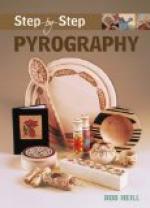In this way many a fenny district of England had been made into fat meadow-land by patient and efficient monks. The knight was glad to encounter one day in a neighboring castle a Carthusian prior whom he had once known in Normandy,—Hugh of Avalon. He invited this churchman to visit him and discuss this and more important matters. It so happened that soon after his arrival Marcel the falconer, Eleanor and Roger, and the squires, Ralph Courtenay and John Lake, were going to try the young falcons on the border of the marsh. There was nothing strange in Sir Walter Giffard suggesting that he and Prior Hugh ride along with the party, for hawking was a sport considered very suitable for churchmen. But on the way to the marsh the knight and the Prior paid little attention to the diversion of falconry. They were deep in consideration of the best way to drain the swamp and deal with it generally.
Eleanor’s heart beat fast as they neared the heronry. It was not a heron, however, which claimed the maiden flight of Mabonde. It was a woodcock flushed in the edge of a copse. Instantly Roger unhooded the cherished hunting-bird, Eleanor gave her a toss into the air, and both sat their horses, eagerly watching her flight. Aloft she soared, the little bells singing like fairy chimes—then dropped like a plummet. There was a ripple in the undergrowth where she pounced, she was recalled to her perch, and presently Marcel, smiling broadly, came up with the woodcock, its gray-brown feathers hardly even ruffled, though it was quite dead.
Then Eleanor remembered something. “Oh!” she said pitifully. “O-h!”
She was recalling a summer day when she and Roger had startled a mother and her chicks from their nest of dead leaves among the grass, the cleverness with which the tiny balls of fluff had matched themselves with the foliage and the utter audacity of the mother bird as she carried them off one by one to safety, under the very eyes of her giant foes. And now she was setting Mabonde to kill those dainty chicks for her own pleasure!
Roger had gone off with the squires after a tercel of which great things were expected, but Sir Walter Giffard, coming up just then, caught sight of his daughter’s woe-begone face. “What is the matter, my little maid?” he asked.
“Nothing,” Eleanor answered, swallowing with some difficulty and winking very fast, “but—I—don’t think I care to hunt any more to-day, father. Will you please take Mabonde?”
The knight’s eyebrows lifted rather quizzically, but he did not question this sudden decision. “Ride with me instead, daughter,” he said kindly, and Eleanor, very subdued and thoughtful, paced along by her father’s side.




